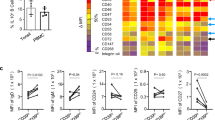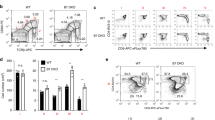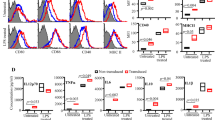Abstract
Cytotoxic T lymphocyte–associated antigen 4 (CTLA-4) plays a critical role in peripheral tolerance. However, regulatory pathways initiated by the interactions of CTLA-4 with B7 counterligands expressed on antigen-presenting cells are not completely understood. We show here that long-term survival of pancreatic islet allografts induced by the soluble fusion protein CTLA-4–immunoglobulin (CTLA-4–Ig) is contingent upon effective tryptophan catabolism in the host. In vitro, we show that CTLA-4–Ig regulates cytokine-dependent tryptophan catabolism in B7-expressing dendritic cells. These data suggest that modulation of tryptophan catabolism is a means by which CTLA-4 functions in vivo and that CTLA-4 acts as a ligand for B7 receptor molecules that transduce intracellular signals.
This is a preview of subscription content, access via your institution
Access options
Subscribe to this journal
Receive 12 print issues and online access
$209.00 per year
only $17.42 per issue
Buy this article
- Purchase on Springer Link
- Instant access to full article PDF
Prices may be subject to local taxes which are calculated during checkout




Similar content being viewed by others
References
Thompson, C.B. & Allison, J.P. The emerging role of CTLA-4 as an immune attenuator. Immunity 7, 445–450 (1997).
Oosterwegel, M.A., Greenwald, R.J., Mandelbrot, D.A., Lorsbach, R.B. & Sharpe, A.H. CTLA-4 and T cell activation. Curr. Opin. Immunol. 11, 294–300 (1999).
Salomon, B. & Bluestone, J.A. Complexities of CD28/B7:CTLA-4 costimulatory pathways in autoimmunity and transplantation. Annu. Rev. Immunol. 19, 225–252 (2001).
Tivol, E. et al. Loss of CTLA-4 leads to massive lymphoproliferation and fatal multiorgan tissue destruction, revealing a critical negative regulatory role of CTLA–4. Immunity 3, 541–547 (1995).
Waterhouse, P. et al. Lymphoproliferative disorders with early lethality in mice deficient in CTLA-4. Science 270, 985–988 (1995).
Perez, V.L. et al. Induction of peripheral T cell tolerance in vivo requires CTLA-4 engagement. Immunity 6, 411–417 (1997).
Leach, D.R., Krummel, M.F. & Allison, J.P. Enhancement of antitumor immunity by CTLA-4 blockade. Science 271, 1734–1736 (1996).
Luhder, F., Hoglund, P., Allison, J.P., Benoist, C. & Mathis, D. Cytotoxic T lymphocyte-associated antigen 4 (CTLA-4) regulates the unfolding of autoimmune diabetes. J. Exp. Med. 187, 427–432 (1998).
Karandikar, N.J., Vanderlugt, C.L., Walunas, T.L., Miller, S.D. & Bluestone, J.A. CTLA-4: a negative regulator of autoimmune disease. J. Exp. Med. 184, 783–788 (1996).
Lin, H. et al. Cytotoxic T lymphocyte antigen 4 (CTLA4) blockade accelerates the acute rejection of cardiac allografts in CD28-deficient mice: CTLA4 can function independently of CD28. J. Exp. Med. 188, 199–204 (1998).
Fallarino, F., Fields, P.E. & Gajewski, T.F. B7-1 engagement of cytotoxic T lymphocyte antigen 4 inhibits T cell activation in the absence of CD28. J. Exp. Med. 188, 205–210 (1998).
Fecteau, S. et al. CTLA-4 up-regulation plays a role in tolerance mediated by CD45. Nature Immunol. 2, 58–63 (2001).
Turka, L.A. et al. T-cell activation by the CD28 ligand B7 is required for cardiac allograft rejection in vivo. Proc. Natl. Acad. Sci. USA 89, 11102–11105 (1992).
Li, W. et al. Costimulation blockade promotes the apoptotic death of graft-infiltrating T cells and prolongs survival of hepatic allografts from FLT3L-treated donors. Transplantation 78, 1423–1432 (2001).
Lenschow, D.J. et al. Long-term survival of xenogeneic pancreatic islet grafts induced by CTLA4Ig. Science 257, 789–792 (1992).
Judge, T.A. et al. The role of CD80, CD86, and CTLA4 in alloimmune responses and the induction of long-term allograft survival. J. Immunol. 162, 1947–1951 (1999).
Zheng, X.X. et al. The role of donor and recipient B7-1 (CD80) in allograft rejection. J. Immunol. 159, 1169–1173 (1997).
Suvas, S., Singh, V., Sahdev, S., Vohra, H. & Agrewala, J.N. Distinct role of CD80 and CD86 in the regulation of the activation of B cell and B cell lymphomas. J. Biol. Chem. 277, 7766–7775 (2002).
Munn, D.H. et al. Prevention of allogeneic fetal rejection by tryptophan catabolism. Science 281, 1191–1193 (1998).
Munn, D.H. et al. Inhibition of T cell proliferation by macrophage tryptophan catabolism. J. Exp. Med. 189, 1363–1372 (1999).
Mellor, A.L. et al. Prevention of T cell-driven complement activation and inflammation by tryptophan catabolism during pregnancy. Nature Immunol. 2, 64–68 (2001).
Grohmann, U. et al. IFN-γ inhibits presentation of a tumor/self peptide by CD8α− dendritic cells via potentiation of the CD8α+ subset. J. Immunol. 165, 1357–1363 (2000).
Grohmann et al. IL-6 inhibits the tolerogenic function of CD8α+ dendritic cells expressing indoleamine 2,3-dioxygenase. J. Immunol. 167, 708–714 (2001).
Fallarino, F. et al. Functional expression of indoleamine 2,3-dioxygenase by murine CD8α+ dendritic cells. Int. Immunol. 14, 65–68 (2002).
Tran, H.M. et al. Distinct mechanisms for the induction and maintenance of allograft tolerance with CTLA-4-Fc treatment. J. Immunol. 159, 2232–2239 (1997).
Taylor, M.W. & Feng G.S. Relationship between interferon-γ, indoleamine 2,3-dioxygenase, and tryptophan catabolism. FASEB J. 5, 2516–2522 (1991).
Gajewski, T.F., Fallarino, F., Uyttenhove, C. & Boon, T. Tumor rejection requires a CTLA-4 ligand provided by the host or expressed on the tumor: superiority of B7-1 over B7-2 for active tumor immunization. J. Immunol. 156, 2909–2917 (1996)
Hassanain, H.H., Chon, S.Y. & Gupta S.L. Differential regulation of human indoleamine 2,3-dioxygenase gene expression by interferons-γ and -α. Analysis of the regulatory region of the gene and identification of an interferon-γ-inducible DNA-binding factor. J. Biol. Chem. 268, 5077–5084 (1993).
Babcock, T.A. & Carlin, J.M. Transcriptional activation of indoleamine dioxygenase by interleukin 1 and tumor necrosis factor α in interferon-treated epithelial cells. Cytokine 12, 588–594 (2000).
Grohmann, U. & Puccetti, P. The immunosuppressive activity of proinflammatory cytokines in experimental models: potential for therapeutic intervention in autoimmunity. Curr. Drug Targets Inflamm. Aller. 1, 77–87 (2002).
Sica, A. et al. Interaction of NF-κB and NFAT with the interferon-γ promoter. J. Biol. Chem. 272, 30412–30420 (1997).
Zhang, S. & Kaplan, M.H. The p38 mitogen-activated protein kinase is required for IL-12-induced IFN-γ expression. J. Immunol. 165, 1374–1380 (2000).
Saccani, S., Pantano, S. & Natoli, G. p38-dependent marking of inflammatory genes for increased NF-κB recruitment. Nature Immunol. 3, 69–75 (2002).
Greenwald, R.J., Boussiotis, V.A., Lorsbach, R.B., Abbas, A.K. & Sharpe, A.H. CTLA-4 regulates induction of anergy in vivo. Immunity 14, 145–155 (2001).
Hall, B.M., Jelbart, M.E., Gurley, K.E. & Dorsch, S.E. Specific unresponsiveness in rats with prolonged cardiac allograft survival after treatment with cyclosporine: mediation of specific suppression by T helper/inducer cells. J. Exp. Med. 162, 1683–1694 (1985).
Qin, S. et al. “Infectious” transplantation tolerance. Science 259, 975–977 (1993).
Grohmann, U. et al. CD40 ligation ablates the tolerogenic potential of lymphoid dendritic cells. J. Immunol. 166, 277–283 (2001).
Mellor, A.L. & Munn, D.H. Tryptophan catabolism and T-cell tolerance: immunosuppression by starvation? Immunol. Today 20, 469–473 (1999).
Fallarino, F. et al. T cell apoptosis by tryptophan catabolism. Cell Death Differ. 9, 1069–1077 (2002).
Latour, S. et al. Bidirectional negative regulation of human T and dendritic cells by CD47 and its cognate receptor signal-regulator protein-α: down-regulation of IL-12 responsiveness and inhibition of dendritic cell activation. J. Immunol. 167, 2547–2554 (2001).
Suzuki, I. & Fink, P.J. Maximal proliferation of cytotoxic T lymphocytes requires reverse signaling through Fas ligand. J. Exp. Med. 187, 123–128 (1998).
van Kooten, C. & Banchereau, J. Functions of CD40 on B cells, dendritic cells and other cells. Curr. Opin. Immunol. 9, 330–337 (1997).
Nathan, C. & Muller, W.A. Putting the brakes on innate immunity: a regulatory role for CD200? Nature Immunol. 2, 17–19 (2001).
Cowan, C.A. & Henkemeyer, M. Ephrins in reverse, park and drive. Trends Cell. Biol. 12, 339–346 (2002).
Kacktein, H., Morelli, A.E. & Thomson, A.W. Designer dendritic cells for tolerance induction: guided not misguided missiles. Trends Immunol. 22, 437–442 (2001).
O'Connell, P.J. et al. Immature and mature CD8α+ dendritic cells prolong the survival of vascularized heart allografts. J. Immunol. 168, 143–154 (2002).
Frasca, L., Scotta, C., Lombardi, G. & Piccolella, E. Human anergic CD4+ T cells can act as suppressor cells by affecting autologous dendritic cell conditioning and survival. J. Immunol. 168, 1060–1068 (2002).
Nakaseko, C. et al. Cytotoxic T lymphocyte antigen 4 (CTLA-4) engagement delivers an inhibitory signal through the membrane-proximal region in the absence of the tyrosine motif in the cytoplasmic tail. J. Exp. Med. 190, 765–774 (1999).
Mandelbrot, D.A. et al. Expression of B7 molecules in recipient, not donor, mice determines the survival of cardiac allografts. J. Immunol. 163, 3753–3757 (1999).
Chang, T.T., Jabs, C., Sobel, R.A., Kuchroo, V.K. & Sharpe, A.H. Studies in B7-deficient mice reveal a critical role for B7 costimulation in both induction and effector phases of experimental autoimmune encephalomyelitis. J. Exp. Med. 190, 733–740 (1999).
Dalton, D.K. et al. Multiple defects of immune cell function in mice with disrupted interferon-γ genes. Science 259, 1739–1742 (1993).
Fallarino, F. & Gajewski, T.F. Differentiation of antitumor CTL in vivo requires host expression of Stat1. J. Immunol. 163, 4109–4113 (1999).
Grohmann, U. et al. IL-12 acts directly on DC to promote nuclear localization of NF-κB and primes DC for IL-12 production. Immunitys 9, 315–323 (1998).
Acknowledgements
Supported in part by the Juvenile Diabetes Research Foundation International (U. G.) and the Italian Association for Cancer Research (P. P.). We thank A. L. Mellor for the generous gift of IDO-specific reagents.
Author information
Authors and Affiliations
Corresponding author
Ethics declarations
Competing interests
The authors declare no competing financial interests.
Rights and permissions
About this article
Cite this article
Grohmann, U., Orabona, C., Fallarino, F. et al. CTLA-4–Ig regulates tryptophan catabolism in vivo. Nat Immunol 3, 1097–1101 (2002). https://doi.org/10.1038/ni846
Received:
Accepted:
Published:
Issue Date:
DOI: https://doi.org/10.1038/ni846
This article is cited by
-
Immune regulation through tryptophan metabolism
Experimental & Molecular Medicine (2023)
-
A lesion-selective albumin-CTLA4Ig as a safe and effective treatment for collagen-induced arthritis
Inflammation and Regeneration (2023)
-
Immune-checkpoint expression in antigen-presenting cells (APCs) of cytomegaloviruses infection after transplantation: as a diagnostic biomarker
Archives of Microbiology (2023)
-
Sodium Selenite Diminished the Regulatory T Cell Differentiation In Vitro
Biological Trace Element Research (2023)
-
Impact of disease-modifying therapy on dendritic cells and exploring their immunotherapeutic potential in multiple sclerosis
Journal of Neuroinflammation (2022)



